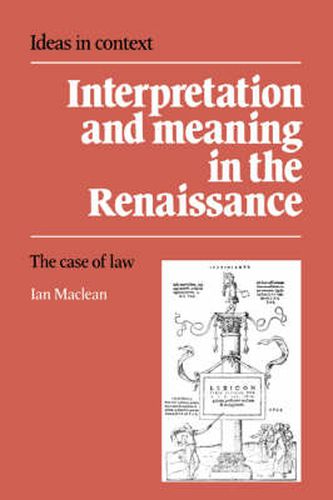Readings Newsletter
Become a Readings Member to make your shopping experience even easier.
Sign in or sign up for free!
You’re not far away from qualifying for FREE standard shipping within Australia
You’ve qualified for FREE standard shipping within Australia
The cart is loading…






This book investigates theories of interpretation and meaning in Renaissance jurisprudence. How do they relate to the institutions of the law, especially pedagogical institutions? What characterizes the most commonly adopted theories of the legal profession? In what form were they published? How do they relate to modern canons of interpretation found in the trivium of grammar, dilaectics and rhetoric? In what ways, if any, do they mark a departure from medieval approaches? How do they relate to modern canons of interpretation? And how do they relate to similar issues in modern semantics and the philosophy of language, such as speech act theory or the ‘logic of the supplement’? An answer to these questions is sought through an investigation of Renaissance problems concerning the authority of interpreters, the questions of signification, definition, verbal propriety and verbal extension, the problem of cavillation, the alternative interpretative strategies of ratio legis and mens legislatoris, the performative functions of language, and custom and equity as means of interpretation.
$9.00 standard shipping within Australia
FREE standard shipping within Australia for orders over $100.00
Express & International shipping calculated at checkout
This book investigates theories of interpretation and meaning in Renaissance jurisprudence. How do they relate to the institutions of the law, especially pedagogical institutions? What characterizes the most commonly adopted theories of the legal profession? In what form were they published? How do they relate to modern canons of interpretation found in the trivium of grammar, dilaectics and rhetoric? In what ways, if any, do they mark a departure from medieval approaches? How do they relate to modern canons of interpretation? And how do they relate to similar issues in modern semantics and the philosophy of language, such as speech act theory or the ‘logic of the supplement’? An answer to these questions is sought through an investigation of Renaissance problems concerning the authority of interpreters, the questions of signification, definition, verbal propriety and verbal extension, the problem of cavillation, the alternative interpretative strategies of ratio legis and mens legislatoris, the performative functions of language, and custom and equity as means of interpretation.